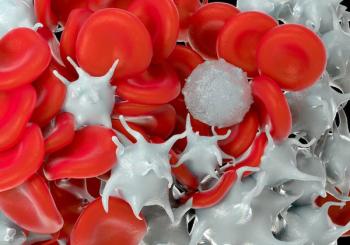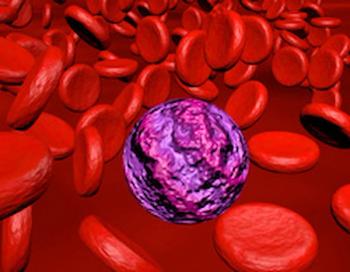
Neoadjuvant camrelizumab plus chemotherapy may hold promise as a standard of care in locally advanced esophageal squamous cell carcinoma, according to Yin Li, MD.

Your AI-Trained Oncology Knowledge Connection!


Neoadjuvant camrelizumab plus chemotherapy may hold promise as a standard of care in locally advanced esophageal squamous cell carcinoma, according to Yin Li, MD.

Investigators of a phase 1 trial identify no safety signals with Orca-Q in the haploidentical stem cell transplantation setting.

The combination of pelabresib plus ruxolitinib shows improvement in hemoglobin response in the MANIFEST-2 trial, supporting a potential shift in the future treatment of patients with JAK inhibitor–naive myelofibrosis.

No patients with myelodysplastic syndrome have any grade 3 or higher acute graft-versus-host disease following treatment with Orca-T in a phase 1b study.

Results from the phase 1/2 SAVE trial demonstrated an improved objective response rate when revumenib was added to decitabine/cedazuridine, and venetoclax for patients with relapsed/refractory acute myeloid leukemia.

Data from the phase 2 KEYLYNK-009 study indicate a lower rate of treatment-related adverse effects with pembrolizumab plus olaparib compared with pembrolizumab plus chemotherapy in those with triple-negative breast cancer.

Data from the phase 2 DESTINY-PanTumor02 trial support trastuzumab deruxtecan as a potential treatment for patients with gynecologic HER2-expressing tumors that have progressed on prior therapy.

Patients with locally advanced or metastatic breast cancer that is hormone receptor–positive, HER2-negative breast cancer with 1 or more PIK3CA, AKT1, or PTEN alterations may now receive capivasertib plus fulvestrant.

Selpercatinib significantly improved efficacy in patients with advanced, multikinase inhibitor–naïve, RET-mutant medullary thyroid cancer.

Many patients with relapsed/refractory multiple myeloma appear to remain on treatment with mezigdomide-based regimens for more than 1 year, according to Albert Oriol, PhD.

Patients with metastatic renal cell carcinoma, and those who have been pretreated with immune checkpoint inhibitors and are naive, saw a benefit with lenvatinib plus pembrolizumab.

Data from the phase 3 CONTACT-03 trial highlight the necessity of randomized, prospective assessment of re-challenge with checkpoint inhibitors in renal cell carcinoma, according to an expert from Dana-Farber Cancer Institute.

Patients with folate receptor alpha (FRα)–high, platinum-resistant ovarian cancer experienced progression-free survival benefit following treatment with mirvetuximab soravtansine-gynx.

Obecatagene autoleucel also appears to result in a high rate of minimal residual disease negativity in a population of patients with relapsed/refractory B-cell acute lymphoblastic leukemia.

Simple hysterectomy may become the new standard of care for patients with low-risk, early-stage cervical cancer, according to an expert from Université Laval in Quebec City, Canada.

A positive R0 resection rate helped to confirm the noninferiority of minimally invasive distal pancreatectomy compared with open distal pancreatectomy in those with resectable pancreatic cancer.

ALLO-316 has some “unique features” that may make it an “attractive” treatment option for those with kidney cancer, according to an expert from The University of Texas MD Anderson Cancer Center.

89Zr-DFO-girentuximab improves sensitivity and specificity in identifying clear cell kidney cancer compared with any metric to date, according to an expert from the University of California, Los Angeles.

Investigators report benefit in patients with CLDN18.2-positive, HER2-negative locally advanced unresectable or metastatic gastric/gastroesophageal junction adenocarcinoma treated with first-line zolbetuximab and mFOLFOX6.

Patients with myelofibrosis and anemia who were previously treated with a JAK inhibitor experienced durable responses up to 48 weeks with momelotinib.

Blinatumomab plus consolidation chemotherapy produced a 58% reduction in the risk of death vs consolidation chemotherapy alone in patients with MRD-negative B-cell acute lymphoblastic leukemia.

Among patients with paroxysmal nocturnal hemoglobinuria, crovalimab yielded stable rates of hemolysis control and transfusion avoidance in the phase 3 COMMODORE trial.

Patients with BCR-ABL1 T315I-mutant chronic myeloid leukemia, chronic phase, or acute phase who are resistant to tyrosine kinase inhibitors were found to show a clinical benefit with olvermbatinib.

Findings from the phase 3 ARCHES trial highlighted a long-lasting survival improvement for patients with metastatic hormone-sensitive prostate cancer who were treated with enzalutamide plus androgen deprivation therapy regardless of whether they received prior local therapy.

Transplants from a matched sibling donor were superior to haploidentical stem cell transplant in terms of 2-year survival in patients with relapsed/refractory acute lymphoblastic leukemia.

Although canakinumab, pembrolizumab, and chemotherapy did not lead to an improvement in survival vs the placebo cohort, it may still have benefit in certain subgroups of patients with previously untreated locally advanced or metastatic non–small cell lung cancer.

Patients with advanced or recurrent uterine serous carcinoma derived promising benefit from treatment with ZN-c3.

Updated data from the phase 1/2 CodeBreaK 100 trial of sotorasib provide the longest follow-up of a KRAS G12C inhibitor in non–small cell lung cancer.

The iPocc trial indicated that patients with ovarian cancer experienced an improvement in progression-free survival when treated with intraperitoneal carboplatin plus paclitaxel compared with intravenous chemotherapy, but this benefit did not translate to overall survival.
![A statistically significant benefit in terms of radiographic progression-free survival (rPFS) was noted with the use of olaparib (Lynparza) vs placebo in combination with abiraterone acetate (Zytiga) for patients with frontline metastatic castration-resistant prostate cancer (mCRPC), according to results of the phase 3 PROpel trial (NCT03732820) that were presented at the 2022 Genitourinary Cancers Symposium.1 The median investigator-assessed rPFS was 24.8 months with olaparib/abiraterone vs 16.6 months with placebo/abiraterone (HR, 0.66; 95% CI, 0.54-0.81; P <.0001), which translated to a 34% reduction in the risk of radiographic disease progression or death. The 1- and 2-year rPFS rates were 71.8% and 51.4% in the olaparib/abiraterone arm, respectively; these rates were 63.4% and 33.6% with placebo/abiraterone, respectively. When evaluated by blinded independent central review, the median rPFS with olaparib/abiraterone was 27.6 months vs 16.4 months with placebo/abiraterone, leading to a 39% reduction in the risk of radiographic disease progression or death (HR, 0.61; 95% CI, 0.49-0.74; P <.0001). The 1- and 2-year rPFS rates with olaparib plus abiraterone were 73.8% and 53.7%, respectively. In the placebo/abiraterone arm, these rates were 60.6% and 34.1%, respectively. Lead study author Fred Saad, MD, FRCS, said that PROpel is the first combination approach to deliver consistent clinical benefits for patients in the first-line mCRPC setting, irrespective of homologous recombination repair (HRR) mutation status. “This benefit led to what I think is the longest rPFS we have seen to date in metastatic CRPC beyond 2 years,” Saad, who is professor and chairman of urology and director of Genitourinary Oncology at the University of Montreal Hospital Center, as well as the Raymond Garneau Chair in Prostate Cancer Research and director of Clinical Research and the Molecular Oncology Research Laboratory in Prostate Cancer, said in a presentation during the meeting. Patients with mCRPC who are treated in the frontline setting have a median survival of approximately 3 years in clinical trial settings, Saad noted, adding that about half of patients in real-world practice only receive 1 line of active treatment. Here, the median survival is less than 2 years, underscoring an unmet need to improve outcomes in the up-front setting. Previously, data with olaparib in mCRPC have shown encouraging results. The phase 3 PROfound trial (NCT02987543) demonstrated significantly prolonged rPFS and overall survival (OS) in patients with mCRPC following a next-generation hormonal agent (NHA) with HRR gene alterations.2 Additionally, a phase 2 trial (NCT01972217) of olaparib and abiraterone showed prolonged investigator-assessed rPFS vs placebo/abiraterone in patients with mCRPC following treatment with docetaxel, regardless of HRR status (HR, 0.65; 95% CI, 0.44-0.97; P = .034).3 In the international, double-blind, phase 3 PROpel trial, investigators randomized patients with mCRPC in the first-line setting 1:1 to receive olaparib at 300 mg twice daily plus abiraterone at 1000 mg daily (n = 399) or placebo and abiraterone at 1000 mg daily (n = 397). Patients could have received docetaxel in the metastatic hormone-sensitive prostate cancer (mHSPC) setting, but no prior abiraterone was allowed. Other NHAs were permitted if they were stopped at least 12 months prior to study enrollment. Patients also had ongoing androgen deprivation therapy and an ECOG performance status of 0 or 1. Stratification factors included site of distant metastases (bone-only vs visceral vs other) and prior taxane in the mHSPC setting (yes vs no). The primary end point was investigator-assessed rPFS, with OS as a secondary end point. Additional outcome measures included time to first subsequent therapy or death (TFST), time to second progression or death (PFS2), objective response rate (ORR), HRR mutation prevalence (retrospective testing), health-related quality of life, and safety and tolerability. Baseline characteristics were well-balanced between the 2 arms. The median age was 69.5 years (range, 43-91), and most patients had an ECOG performance status of 0 (70.1%). Of note, symptomatic patients (Brief Pain Inventory-Short Form ≥4 and/or opiate use) comprised 25.8% and 20.2% of olaparib- and placebo-treated patients, respectively; 22.5% of patients had received docetaxel at the mHSPC stage. Additionally, patients either had HRR mutations (27.8% with olaparib vs 29.0% with placebo), non-HRR mutations (69.9% vs 68.8%, respectively), or unknown HRR mutation status (2.3% each). The median PSA was 17.90 ug/L (interquartile range [IQR], 6.09-67.00) with olaparib/abiraterone and 16.81 ug/L (IQR, 6.26-53.30) with placebo/abiraterone. Most metastases occurred in the bone at 87.5% and 85.4% of patients, respectively. Additional findings showed that the rPFS benefit was observed across all prespecified subgroups, including age (<65 years, HR, 0.51; 95% CI, 0.35-0.75; ≥65 years, HR, 0.78; 95% CI, 0.62-0.98), site of distant metastases (bone-only, HR, 0.73; 95% CI, 0.54-0.98; visceral, HR, 0.62; 95% CI, 0.39-0.99; other, HR, 0.62; 95% CI, 0.44-0.85) prior docetaxel (yes, HR, 0.61; 95% CI, 0.40-0.92; no, HR, 0.71; 95% CI, 0.56-0.89) and HRR mutation status (HRR mutant, HR, 0.50; 95% CI, 0.34-0.73; non–HRR mutant, HR, 0.76; 95% CI, 0.60-0.97). “We did do a global interaction test, which was not significant,” Saad added. OS data, which were at 28.6% maturity, showed that the median OS was not reached in either arm but trended toward improved survival with olaparib/abiraterone vs placebo/abiraterone (HR, 0.86; 95% CI, 0.66-1.12; prespecified 2-sided alpha P = .29). TFST also was favored with the addition of olaparib. The median TFST was 25.0 months in the olaparib/abiraterone arm compared with 19.9 months with placebo/abiraterone (HR, 0.74; 95% CI, 0.61-0.90; P = .004). Furthermore, the median PFS2 was not reached in either arm, but supported longer-term benefit with olaparib/abiraterone (HR, 0.69; 95% CI, 0.51-0.94; P = .0184). When evaluated for response, the ORR with olaparib plus abiraterone was 58.4% with a 4.3% complete response (CR) rate and a 54.0% partial response (PR) rate. The stable disease (SD) rate was 26.1% and the progressive disease (PD) rate was 13.7%. In the placebo/abiraterone arm, the ORR was 48.1%, which comprised a 6.3% CR rate and a 41.9% PR rate; the SD and PD rates were 28.1% and 19.4%, respectively. The odds ratio in ORR between olaparib/abiraterone and placebo/abiraterone was 1.60 (95% CI, 1.02-2.53; P = .0409). Saad noted that 40.3% of the overall study population had measurable disease via RECIST v1.1 criteria at baseline. Regarding safety, adverse effects (AEs) occurred in 97.2% and 94.9% of olaparib/abiraterone- and placebo/abiraterone-treated patients, respectively; grade 3 or higher AEs occurred in 47.2% and 38.4% of patients, respectively. AE-related deaths occurred in 4.0% (n = 16) of those on the olaparib arm compared with 4.3% (n = 17) of patients on the placebo arm. Dose interruptions and reductions occurred in 44.7% and 20.1% of patients who received the addition of olaparib; these rates were 25.3% and 5.6% for those on the placebo arm. Additionally, more patients discontinued olaparib due to an AE (13.8%) compared with 7.8% of patients receiving placebo. A total of 8.5% and 8.8% of patients in each arm, respectively, discontinued abiraterone due to an AE. There were no cases reported of myelodysplastic syndrome or acute myeloid leukemia, and the incidence of new primary cancers and pneumonitis were balanced between the 2 arms, Saad said. The AE profiles were consistent with the known toxicity profiles of the individual agents. The most common all-grade and grade 3 or higher AE with olaparib was anemia (46.0% and 15.1%, respectively). In the placebo arm, this occurred in 16.4% and 3.3% of patients, respectively. Cardiac failure occurred at similar rates between the 2 arms at 1.5% with olaparib and 1.3% with placebo; arterial thromboembolic events were also similar at 2.0% and 2.5%, respectively. However, numerically higher venous thromboembolic events were reported for olaparib/abiraterone (7.3%) vs placebo/abiraterone (3.3%), with pulmonary embolism being the most reported venous thromboembolic event (6.5% vs 1.8%, respectively). Pulmonary embolism events were mostly incidental findings via CT scans, and Saad added that this did not lead to treatment discontinuation with either olaparib or abiraterone. Quality of life was also found to be comparable between the 2 groups. References Saad F, Armstrong AJ, Thiery-Vuillemin A, et al. PROpel: phase III trial of olaparib (ola) and abiraterone (abi) versus placebo (pbo) and abi as first-line (1L) therapy for patients (pts) with metastatic castration-resistant prostate cancer (mCRPC). J Clin Oncol. 2022;40(suppl 6):11. doi:10.1200/JCO.2022.40.6_suppl.011 Hussain M, Mateo J, Fizazi K, et al. Survival with olaparib in metastatic castration-resistant prostate cancer. N Eng J Med. 2020;383(24):2345-2357. doi:10.1056/NEJMoa2022485 Clarke N, Wiechno P, Alekseev B, et al. Olaparib combined with abiraterone in patients with metastatic castration-resistant prostate cancer: a randomised, double-blind, placebo-controlled, phase 2 trial. Lancet Oncol. 2018;19(7):975-986. doi:10.1016/S1470-2045(18)30365-6](https://cdn.sanity.io/images/0vv8moc6/cancernetwork/d97c82ab46f3114f8f67bcbafa061ef7adad240a-1200x900.jpg?w=350&fit=crop&auto=format)
Results of the phase 3 PROpel trial presented at 2022 ASCO GU indicate a benefit of olaparib-based therapy for patients with metastatic castration-resistant prostate cancer receiving treatment in the frontline setting.